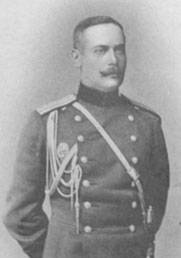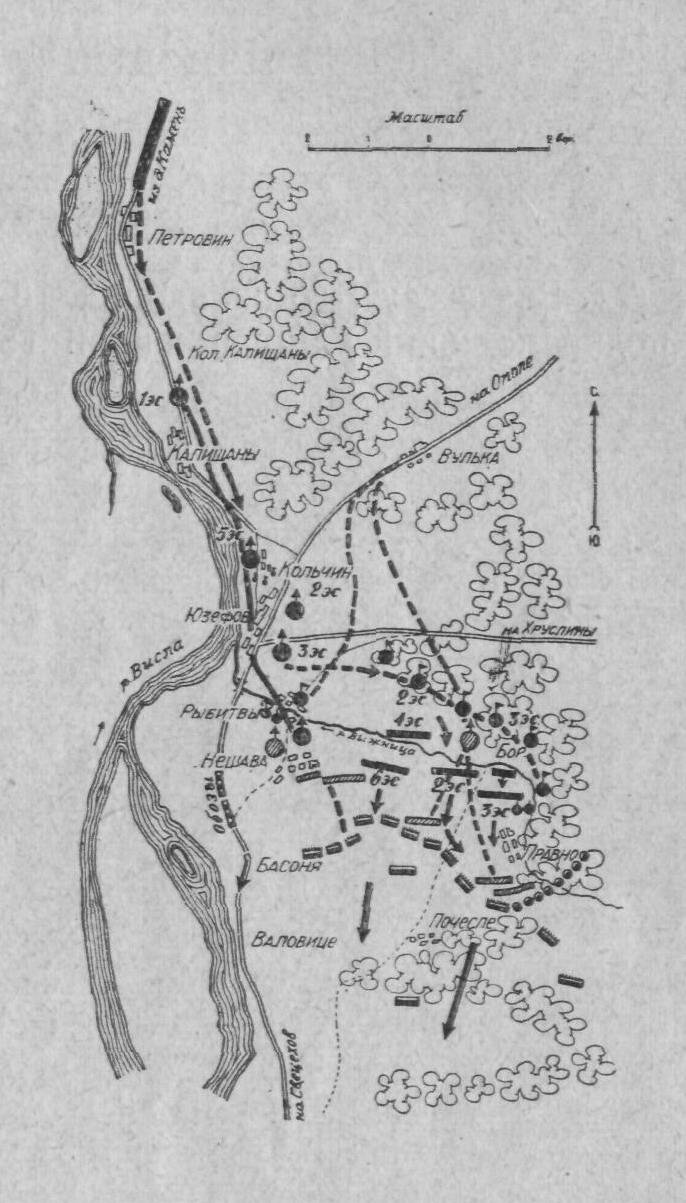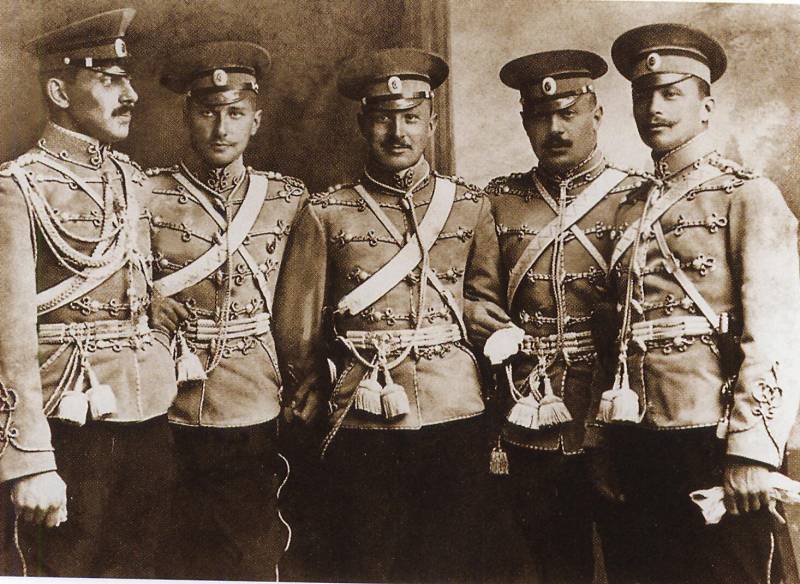Night Attack of the Narva Hussars
27 August 1914, the 13 Cavalry Division marched from the village of Kamen to the village of Jozefov. A day before this, the village was captured by Austrian infantry. The vanguard was sent ahead - the 1 squadron of the 13 hussar Narva regiment under the command of the captain Baranov.
In the hunt for carts.
At der. Kalishany received an order: 4 machine guns, under the guise of the 5 th squadron of the Narva hussars, take der. Kolchin to ensure the right flank of the division.
At the approach to the village. Yuzefov from the 13 Uhlansky Vladimirsky regiment received a report stating that movement of enemy carts was observed behind the suburb.
Narva Hussars were ordered to attack and seize the enemy's train.
The 2 and 3 squadrons of the regiment under the command of Colonel S. M. Lempitsky turned into lava — it was necessary to reconnoiter the area in the Pravno-Neshava-Rybitva area. As soon as the squadrons passed pos. Yuzefov, bypassing him from the south side, as shrapnel fire was opened on them by Austrian batteries - but due to high ruptures he caused insignificant damage.
By this time, the enemy's carts had already moved so far that their capture, and even under enemy fire, was impractical. Therefore, the squadrons, going into the woods and sending intelligence, expected the approach of their artillery and infantry - parts of the Life Guards of the 3 Infantry Regiment of His Majesty.
The reconnaissance of the 2 and 3 squadrons at that time detected the enemy’s infantry who had occupied the trenches in the forest.
The approached parts of the Life Guards 3 Infantry Regiment of His Majesty began an offensive on the move, without reconnaissance and training. Guards arrows went too far - and, because of the small size, their left flank began to bypass the enemy. The right-flank company of the regiment went into a bayonet attack, but, in the situation of a numerical superiority of the enemy, was forced to retreat.
Night attack.
Getting quickly dark. At this time there were cries: "Cavalry forward!" Since the shouts came from the area where the Guards arrows had just attacked, one could assume one of two things: either the Austrians are running and the cavalry is needed for pursuit, or the arrows are cut off by the enemy, and help is needed from the cavalry.
The regiment commander, Colonel Polovtsov, sent Colonel Lempitsky for a personal report of the situation to the division commander. Lempitsky returned with an order: the Narva Hussar Regiment, supported by the 2 squadrons of the 13 Dragoon Military Order of the Regiment and the 2 s of the hundreds of 9 Don Cossack Regiment, supported the Guards riflemen.
But the regiment had already attacked the enemy trenches.
The first to attack was the 3 squadron commanded by staff captain Veselov, the 2 squadron commanded by captain Mikhailov and the 6 squadron commanded by Lieutenant Golenovsky, and then the 4 squadron commanded by squadrons under squadron commands. 1 th squadron, remaining at the disposal of the commander of the infantry regiment at the village. Neshava, moved the last, but then was returned. The regiment communications command commanded by Lieutenant Baikov 2 also took part in the attack, while the 5 squadron, who was with the machine-gun crew on the flank of the regiment, did not participate in the battle.

Il 1. Colonel N. P. Polovtsov, commander of the 13 Hussars of the Narva Regiment.
Over rough terrain in complete darkness, the regiment swiftly went on the attack, guided by the fires of enemy shots. The enemy, entrenched in the trenches, led intensive rifle and machine-gun fire.
With a shout of "Hurray", the hussars swept through 3 of a number of enemy trenches, chopped and stabbed the enemy entrenched in them. Bursting into the woods, the hussars fought off the half-capture of the guards shooters captured earlier by the Austrians. The Austrian infantry, knocked out of the trenches, was only able to escape due to the darkness — it fled in disarray and hid in the forest.
In the morning it became known from the orderlies that the enemy’s trenches were overwhelmed, in the literal sense of the word, killed by the Austrians.
Losses of Narva hussars - 8 officers and 38 privates killed and injured, another 11 hussars went missing. The horses were killed and injured 40, and missing - around 20.
The 13 hussar Narva regiment received special commendation from the command for this dashing night attack, and the commanders of the 3 squadron, Staff Captain Veselov and 2 Squadron, Captain Mikhailov received military awards.
The cossacks who contributed to the attack also suffered losses.
In the Military Journal of the 9 Don Don Cossack General Adjutant Count Orlov-Denisov Regiment wrote: “On August 27 the regiment with the Narva Hussars was ordered to attack the enemy’s position at the village. Scratching Moving to the village and passing the village. Yuzefov shouts of “cavalry forward” began to be transmitted: the Guards arrows (3 guards. P. P.), Who were obsessed with pursuing the enemy, asked for help, around 6 their mouths were surrounded and almost cut off by reinforcements arriving to the enemy. It was already around 9 in the evening and it was completely dark when the regiment rushed to the rescue of the infantry with a geek and attacked the enemy; stunned by a formidable mighty geek and a surprise strike in the dark. The Austrians were shot down and began to retreat. The arrows were released. On this day, the regiment lost the killed 3 Cossacks, missing: 1 officer; the wounded: 1 officer and 7 Cossacks; horses killed 19, injured 9. This case cost the Austrians a lot more, since the next day more than 30 people were found dead at the battlefield. ” (RGVIA. F. 2007. Op. 1. D. 38. Ch. 5).
Russian cavalry in the course of the entire war rescued other branches of the army and brilliantly acted in the most diverse conditions of the tactical situation.

Il 2. The scheme of the battle.

Il 3. The officers of the 13 th hussar Narva regiment.
Information